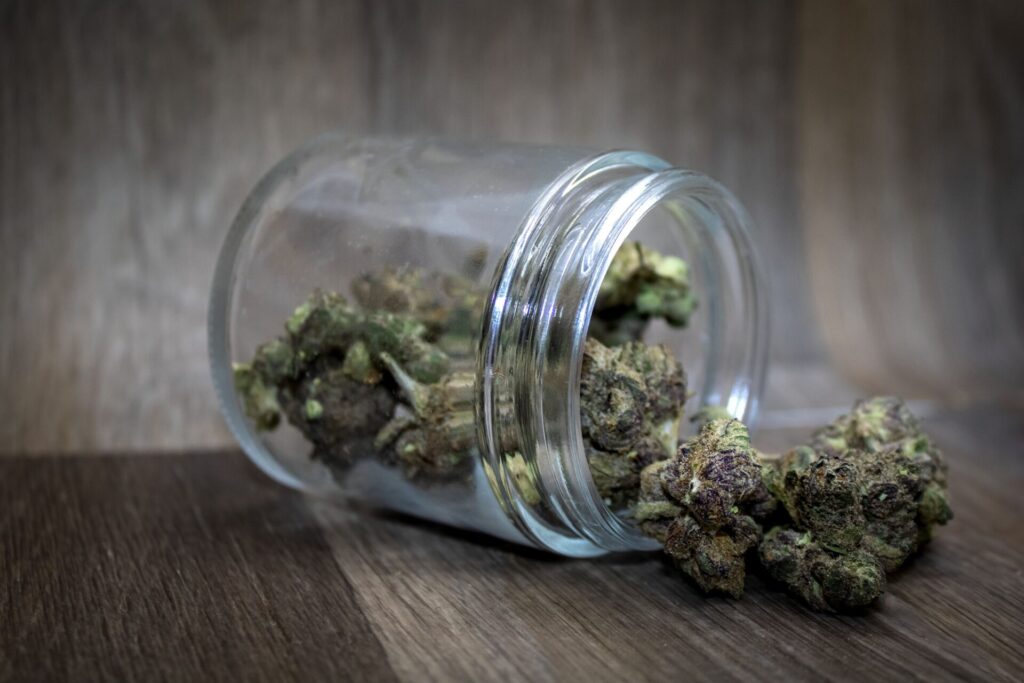How Delta 8 THC Impacts Appetite and Food Intake: Effects and Insights
Do you want to know how Delta 8 THC impacts appetite and food intake? This article will explain how this milder alternative to Delta 9 THC can stimulate hunger and increase food consumption. We will delve into the science behind its effects and its potential benefits for health.
👉Also Read: Can Delta 8 THC Boost Your Focus and Mental Clarity? Here’s What You Need to Know
Understanding Delta 8 THC
Delta 8 THC is a psychoactive cannabinoid found naturally in hemp, derived from cannabis sativa and indica plants. It is often produced by isomerizing CBD due to its trace amounts in the cannabis plant. Unlike its more famous counterpart, Delta 9 THC, Delta 8 THC has a milder psychoactive effect and binds less effectively to CB1 and CB2 receptors, resulting in a calmer mind and body experience for users.
The cannabis industry has seen a rise in cannabis product Delta 8 THC products, from vape cartridges to edibles, due to their legal availability in hemp or marijuana marketplaces. This cannabinoid is commonly called ‘weed light’ or ‘diet weed.’ The name reflects its less intense effects. Users report that Delta 8 THC provides a balanced experience, making it a popular choice for those seeking the benefits of THC without the overwhelming high.
Recognizing Delta 8 THC’s unique properties and differences from other cannabinoids is key. Its mild potency appeals to those exploring cannabis benefits without the intense effects of Delta 9 THC.
Understanding its interaction with the body reveals how Delta 8 THC influences appetite and food intake.
The Science Behind Delta 8 THC and Appetite Stimulation
Delta 8 THC significantly impacts appetite through its interaction with the body’s endocannabinoid system. This system plays a crucial role in regulating various physiological processes, including hunger and food intake. By activating hunger-promoting hormones and enhancing sensory experiences, Delta 8 THC not only makes meals more enjoyable but also increases overall food consumption.
Understanding the specific mechanisms at play is crucial.
Interaction with the Endocannabinoid System
The endocannabinoid system is vital for regulating appetite, and Delta 8 THC’s ability to bind to CB1 receptors in the brain is a key factor in this process. These receptors are critical for appetite regulation and are linked to hunger and food intake. Modulating these receptors allows Delta 8 THC to stimulate appetite, proving useful for those needing to increase their food intake.
Delta 8 THC’s interaction with the endocannabinoid system suggests its potential to influence other physiological processes as well. This cannabinoid’s ability to enhance appetite through CB1 receptor activation underscores its unique role among cannabis products, highlighting its status as a primary psychoactive component.
Additionally, Delta 8 THC affects hormone release and the brain’s reward pathways to boost appetite.
Role of Ghrelin Hormone
Ghrelin, known as the “hunger hormone,” plays a vital role in appetite stimulation. Delta 8 THC enhances its release, signaling hunger to the brain.
Activating CB1 receptors, Delta 8 THC promotes ghrelin release, amplifying hunger signals and increasing appetite, making it effective in boosting food intake.
Brain’s Reward System Activation
Delta 8 THC’s ability to activate the brain’s reward pathways is another significant factor in its appetite-stimulating effects. By enhancing these reward pathways, Delta 8 THC makes food consumption more rewarding and enjoyable. This heightened pleasure associated with eating leads to increased food intake and can contribute to an overall sense of well-being.
Additionally, increased food consumption from Delta 8 THC can promote relaxation and pain relief, especially beneficial for those with chronic pain, offering both physical relief and enhanced nutrition. Understanding these mechanisms helps us appreciate how Delta 8 THC supports appetite and health.
How Delta 8 THC Affects Food Intake
Delta 8 THC is well-known for its orexigenic properties, meaning it can stimulate appetite. This cannabinoid’s ability to enhance sensory experiences and increase cravings significantly impacts food intake.
The following subsections delve into these specific effects.
Enhanced Taste and Smell
Delta 8 THC can intensify sensory perceptions, particularly taste and smell, making foods taste richer and more flavorful. This enhancement leads to a more pleasurable eating experience, significantly increasing food intake.
This intensified sensory perception is well-documented. By making food more appealing, Delta 8 THC encourages users to eat more, benefiting those needing increased calorie intake for health reasons.
Increased Cravings
Delta 8 THC consumption is linked to stronger cravings for foods that are typically high in sugar and fats. Users often report a heightened desire for sweet and fatty foods, which can result in increased caloric intake. These cravings can be particularly intense, making it important to manage them responsibly to avoid unhealthy eating habits.
These cravings, though potentially leading to overeating, highlight Delta 8 THC’s potent effects on appetite. Managing these cravings is crucial for users, especially those with specific dietary needs or health concerns.
Consumer Reports on Appetite Changes
Many users have shared anecdotal accounts of experiencing heightened appetite and cravings after consuming Delta 8 THC. These reports often highlight significant increases in food intake, which can be beneficial for individuals with conditions like cancer or HIV/AIDS that require increased caloric consumption.
For chemotherapy patients, Delta 8 THC can stimulate appetite and aid in weight gain. These reports provide insights into the practical benefits of Delta 8 THC for managing appetite and improving health.
Potential Benefits of Increased Appetite
Increased appetite due to Delta 8 THC use can offer numerous potential health benefits. From aiding weight gain in medical conditions to improving nutrient absorption and providing pain relief, the benefits are substantial.
Let’s explore these benefits in more detail.
Weight Gain for Medical Conditions
For individuals undergoing treatments that reduce food intake, such as chemotherapy, managing appetite is crucial. Delta 8 THC can significantly aid in this process by stimulating appetite and promoting weight gain. Healthcare professionals can offer personalized advice on using Delta 8 THC to manage appetite effectively, ensuring that patients receive the necessary nutrition.
Increasing food intake with Delta 8 THC helps individuals maintain a healthy weight, essential for overall health and recovery, making it valuable for those dealing with appetite loss due to medical conditions or treatments.
Better Nutrition Absorption
An increase in appetite facilitated by Delta 8 THC can lead to better overall nutrition absorption and health outcomes. When individuals consume more food, they are likely to intake more nutrients, enhancing their overall health.
To manage increased appetite effectively, choosing nutrient-dense foods is crucial. Incorporating high-fiber foods into meals enhances fullness and supports digestive health, ensuring increased caloric intake benefits overall well-being.
Pain Relief and Relaxation
Delta 8 THC is known to stimulate appetite, which can lead to increased food intake and subsequent health benefits. This increased food intake can provide relief from chronic pain by promoting caloric intake, which supports overall health.
Delta 8 THC can induce relaxation, contributing to overall well-being. Combining appetite stimulation with relaxation and pain relief, Delta 8 THC offers a holistic approach to improving quality of life.
Managing Increased Appetite Responsibly
Though Delta 8 THC can significantly increase appetite, managing this effect responsibly is important. Mindful eating practices can help control appetite, ensuring increased food intake supports overall health.
The following subsections provide strategies and advice for managing increased appetite.
Healthy Eating Strategies
Focusing on healthy food options can lead to improved nutrition absorption and provide necessary benefits for overall health. For individuals needing to gain weight due to medical conditions, Delta 8 THC can be a helpful tool to encourage healthy food intake.
Mindful eating practices, like choosing nutrient-dense foods and practicing portion control, can prevent overeating and promote a balanced approach to food consumption.
Avoiding Overeating
Choosing nutrient-dense foods, practicing portion control, and remaining mindful during meals are essential strategies to prevent overeating with Delta 8 THC. A balanced approach helps control appetite and contributes to better overall health outcomes.
Healthcare providers can offer personalized advice and oversight when integrating Delta 8 THC into dietary habits, ensuring informed health decisions.
Consulting Healthcare Providers
Discussing Delta-8 THC use with healthcare providers is recommended, especially for those with pre-existing health conditions. Before starting, it’s wise to discuss potential health impacts with a professional to ensure safe and effective use.
Consulting healthcare providers can provide valuable insights and personalized advice, helping users manage their appetite and overall health responsibly.
Legal Status and Safety Considerations
Understanding the legal and safety aspects of Delta 8 THC is crucial for responsible use. The following subsections cover varying state laws and important safety standards for purchasing and using Delta 8 THC products.
State Laws and Regulations
The legal status of Delta 8 THC varies significantly across different states. Currently, it is legally available in 22 states and one district, but restrictions may apply. Some states, like Alabama and Kentucky, have implemented age restrictions on the purchase of Delta 8 THC to ensure it is only accessible to adults.
However, a total of 17 states have outright bans on Delta 8 THC, while another 7 states have severe restrictions. Legal actions and ongoing debates regarding Delta 8 THC’s status create an environment of uncertainty.
Staying informed about local laws and regulations ensures compliance and helps avoid legal issues. Checking updates from state authorities and the FDA can help users navigate the complex legal landscape of Delta 8 THC.
👉Also Read: Delta 8 and Air Travel: Essential Guidelines for 2024
Safety and Quality Standards
Safety is a major concern for consumers of Delta 8 THC due to the lack of regulation in its production. The extraction process often involves chemicals, raising concerns about the final product’s purity and safety. Purchasing Delta 8 products from regulated sources ensures safety and quality.
Regulated sources follow stringent safety and quality standards, reducing the risks associated with impurities and contaminants. By choosing products from reputable providers, users can enjoy the benefits of Delta 8 THC while minimizing potential health risks. Staying informed and cautious about product quality is essential for safe and effective use.
Unlock the Benefits of Delta 8 THC with Laughing Buddha
At Laughing Buddha, we prioritize quality and safety, offering premium Delta 8 THC products designed to enhance your experience. Whether you’re exploring the appetite-stimulating effects of Delta 8 THC or seeking a milder alternative to Delta 9, our curated selection has you covered. From Delta 8 disposable vape cartridges to edibles, we ensure every product meets strict safety and quality standards, giving you the confidence to shop with ease.
Visit our online storetoday to explore our Delta 8 THC offerings. Experience fast shipping, reliable service, and the trusted quality you deserve. Start your journey with Laughing Buddha now.
All products for sale on this website contain a value of less than 0.3% DELTA-9 THC.
FDA Disclosure: This product is not for use by or sale to persons under the age of 21, depending on the laws of your governing state or territory. This product should be used only as directed on the label. It should not be used if you are pregnant or nursing. Do not operate a vehicle or heavy machinery after using these products. Consult with a physician before use, especially if you have a medical condition or use prescription medications. A doctor’s advice should be sought before using any of these products. All trademarks and copyrights are property of their respective owners and are not affiliated with nor do they endorse this product. These statements have not been evaluated by the FDA. These products are not intended to diagnose, treat, cure or prevent any disease. By using this site you agree to follow the Privacy Policy and all Terms & Conditions printed on this site, void where prohibited by law. Further, the purchaser of these products bears all risk and assumes all liability associated with the purchase, use, and possession of these products.
This website is not offering medical advice. By using this website, you agree to our Privacy Policy and all Terms & Conditions published on this website.
Void where prohibited. All trademarks and copyrights are protected by law.
Please do not copy or republish any content on this website or likeness thereof without our written consent.
Be In The Know
Be the first to learn about new Laughing Buddha flavors and Delta-8 products.



